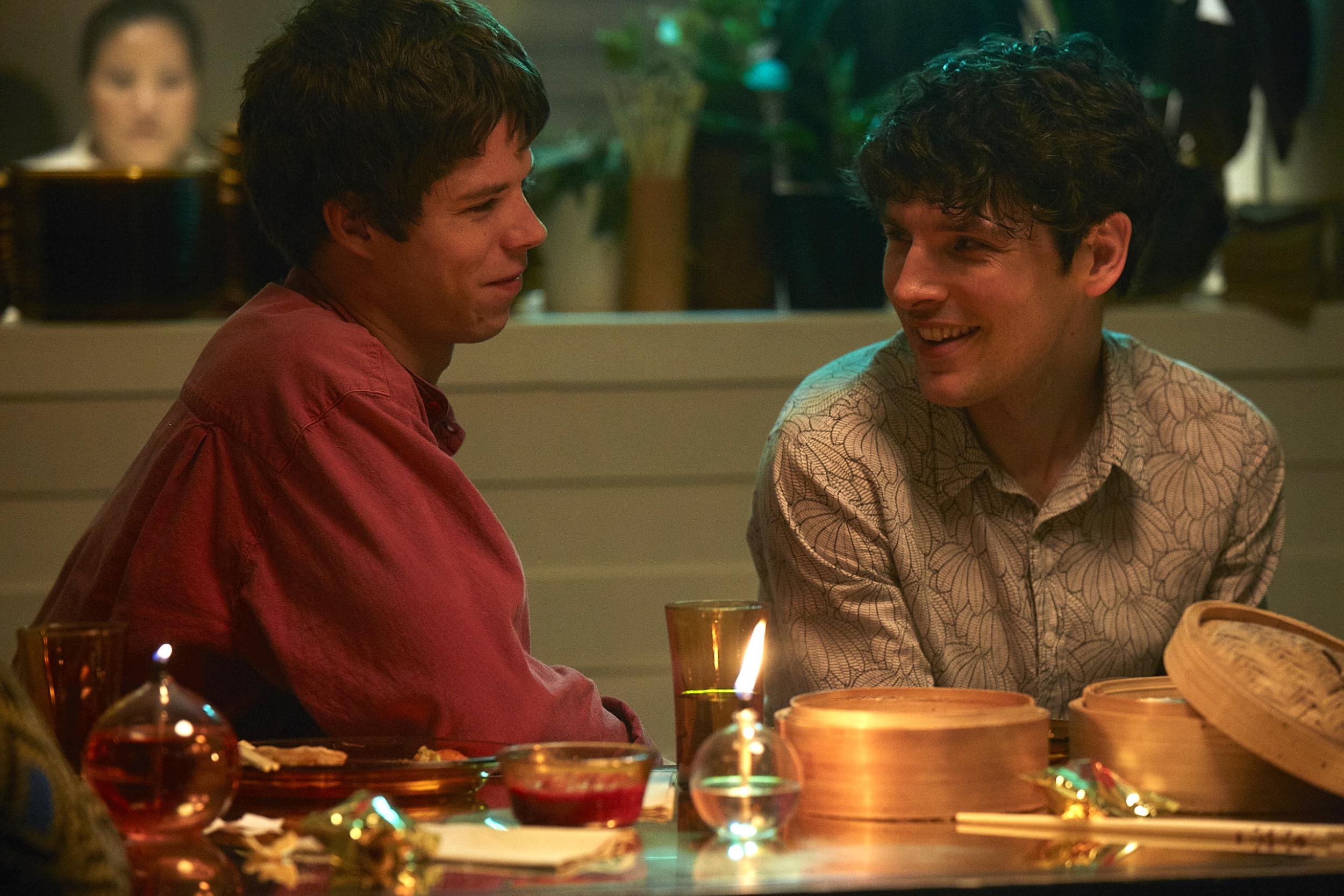Simon Amstell: ‘I thought I was the victim in relationships – in fact they were having to cope with a maniac’
The comedian, writer, director and former ‘Never Mind The Buzzcocks’ host talks to Alexandra Pollard about his new film ‘Benjamin’, learning to accept love, and using humour instead of panicking


Benjamin is about a man who’s so defended, he’s incapable of love,” says Simon Amstell, fixing me with the same bemused, boyish grin he’s been sporting since his Never Mind the Buzzcocks days. “He’s desperately searching for the love of an audience, because that’s safer. That’s something that he knows how to do, and he thinks he has to appear very... special, in order to receive love.” If Amstell’s new feature film was any closer to his own experience, it would be called “Simon”.
The 39-year-old, who is sipping on a mug of tea in a London private members’ club, says he even considered auditioning himself to play the film’s protagonist. “But then I thought, maybe it’s enough for my ego to just have ‘written and directed by...’ I don’t know if I need my face in everything as well.” Instead, he cast Merlin star Colin Morgan as Benjamin, an awkward, compulsively facetious filmmaker struggling to live up to the potential of his debut movie. Morgan is excellent, wringing humour and pathos from lines such as: “I think when people say they like what you’ve done, it’s best to just stop doing it, or they could start hating you. Ideally, I’d have just made that film and died.”
When the character finds himself edging towards a healthy relationship, with a dreamy French musician called Noah (Phénix Brossard), he nips it in the bud for reasons even he doesn’t fully understand. “One of the things I learnt from writing the film,” says Amstell, “was how insane I’d been in relationships. While previously, from my perspective, I was the victim of people who were pushing me too hard, in fact they were having to cope with a maniac.”

Amstell doesn’t consider himself to be such a “maniac” these days. He grew up in a Jewish family in east London – an experience he mined for his BBC sitcom Grandma’s House – and though he knew he was gay at 13, he didn’t come out until he was 21. “I think everything I have ever done,” he recently wrote in The Big Issue, “has been an attempt to reach a hand out to my teenage self and tell him he is OK.”
With Benjamin, though, he’s reaching out to his twenty-something self. “Being in the edit and watching some of the scenes,” he says, “I would feel so sorry for the younger me. I would think, ‘Oh you poor thing, you didn’t know what you were doing’. And nobody could have helped.

“I’m fine now,” he continues. “I really am! Unlike Benjamin, I’ve been in a relationship for the past seven years. I’ve had enough therapy to allow myself to be with another human being without any need to do a whole tap dance for them. So I definitely am fine now. He isn’t. Ah-ha-HA!” A sharp, three-syllabled laugh bursts out of him – the first of many.
Amstell started writing the film five years ago – but it was put on hold while he made the BBC mockumentary Carnage, which is set in a future where meat-eating has become inconceivable (Amstell is a vegan). He did a couple of standup tours, too, in which he emotionally lacerated himself on stage every night. Did he draw from any of those shows for Benjamin’s best friend Stephen, an aspiring comedian who bombs catastrophically? “I’ve had gigs that have gone almost as badly as that,” says Amstell. “He wants to retire. That’s his last gig, he thinks. And I feel that occasionally.”
“It usually comes when you’re quite tired,” he continues. “Where you just think, ‘This is too hard. This is too hard to keep giving and giving’, if you’re not feeling like you’re getting the satisfaction of giving whatever it is that you’re giving.” He screws up his nose. “There’s a lot of the word ‘giving’ in that sentence. It might not be worth printing. Shall I try and make that better?” If he’d like. “You have to... There’s no amount of applause that is going to make you happy. You eventually come to a place where it’s the joy of doing a thing that you know how to do, and want to do better – that is the fulfilment. That’s it. It isn’t the result. It isn’t anything external. There you go! I’m so happy with myself when I get to the end of a sentence, and it makes sense!”
Amstell is a far less assured interviewee than interviewer. And less acerbic too. This, after all, is the man who made a name for himself dryly mocking stars such as Britney Spears and Marilyn Manson – first on Channel 4’s Popworld from 2001 to 2006, then on BBC pop panel show Never Mind the Buzzcocks for two years after that. It was the latter that cemented his status as a destroyer of egos.

Watch Apple TV+ free for 7 day
New subscribers only. £9.99/mo. after free trial. Plan auto-renews until cancelled.
ADVERTISEMENT. If you sign up to this service we will earn commission. This revenue helps to fund journalism across The Independent.

Watch Apple TV+ free for 7 day
New subscribers only. £9.99/mo. after free trial. Plan auto-renews until cancelled.
ADVERTISEMENT. If you sign up to this service we will earn commission. This revenue helps to fund journalism across The Independent.
Such was Amstell’s impish charm that he got away with saying things few others would dare to. When Noel Fielding suggested that Courtney Love would “crush” Amstell if she ever came on the show, he shot back, “or kill me and make it look like suicide”. When Lily Allen appeared as a guest at the height of her fame, he told her, “I know you have issues with intimacy. You have 100,000 friends on MySpace, but are they real friends that you can touch? No.” Often, his “jokes” veered uncomfortably close to the truth. “Do you want another drink?” he asked a clearly inebriated Amy Winehouse, with whom he had earned a good rapport back on Popworld, in 2006. “Yes.” “No! Do you want us to just sit here while you drink yourself to death?” The audience laughed, as did Winehouse, but there was a genuine concern folded into his comic plea. He didn’t always get away with it: The Ordinary Boys frontman Preston stormed off set when Amstell started scornfully reading excerpts from his wife Chantelle Houghton’s autobiography. “Oh no, we can’t lose Preston!” lamented Amstell, sarcastically.
That show, it turns out, is the last thing he wants to discuss. I have to briefly ask him about it, I say. “Do you?” he squeaks. “DO YOU THOUGH?!” Yes! “I’m gonna give you a really boring answer, so you can’t use it.” People liked him because he fought against the media’s usual reverence for celebrity. Has that reverence improved or worsened in the decade since? “I don’t know the answer actually,” he says, a little triumphantly. “I really don’t. What’s the answer? I don’t know. I feel like I want to say something about social media, but I can’t think what that would even be. I think anything I say is gonna be very broad and vague. Sorry.”
OK. Let’s talk about his humour instead. Benjamin uses it as a way of preventing anyone getting too close. Amstell has spoken, too, of using humour as a defence mechanism. What would he have done if he hadn’t been naturally funny? “I guess you end up developing the thing that works for you,” he says. “If I’d have been really good at dancing as a kid, if I’d have achieved more than my certificate in preparatory tap, then that would have been my thing. You can’t really tap dance in social situations, that’s the only problem. I think as much as I talk about humour being a defence mechanism, I’m also really grateful that I developed it, because I now have it as a choice, rather than a panic button. I feel like it’s there if I want to use it. It’s fun. I quite like being cheeky and naughty. I quite like taking those risks in social situations and breaking the monotony of life a little bit.”
In the past, social situations weren’t always places in which Amstell was comfortable. Often, in fact, they triggered full-on existential crises. “It was somebody’s leaving do,” he recalls of an evening many years ago, “and we were in a beautiful garden, and those paper lanterns were being lit and sent off into the sky, and it was so cinematic. I remember thinking something like, ‘This is so beautiful, and everyone here is so young and beautiful, and they’re all going to die’. Ah-ha-HA! It’s a very depressive thought.”
He doesn’t think like that anymore, he says. “I’m trying to think how I got out of that kind of thinking. What’s the answer?” He umms and ahhs for a moment. “Oh yes! Sorry. I think once you have a bit of self-acceptance, those thoughts dissipate, because really, what those thoughts are about is, ‘I don’t fit in here. Everyone is having a lovely time apart from me. Everyone is effortless and fluid and beautiful apart from me.’ And once you realise that either you’re also beautiful, or everyone else is also an anxious lunatic, then those thoughts don’t pop up as much.” He flashes that grin again. “Ooh, that took me a while to figure out, but I’m glad we did that.”
Benjamin is released in UK cinemas Friday, 15 March
Join our commenting forum
Join thought-provoking conversations, follow other Independent readers and see their replies
Comments
Bookmark popover
Removed from bookmarks